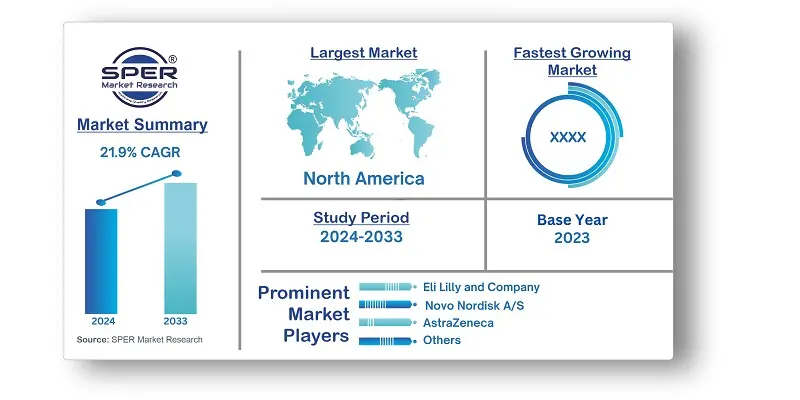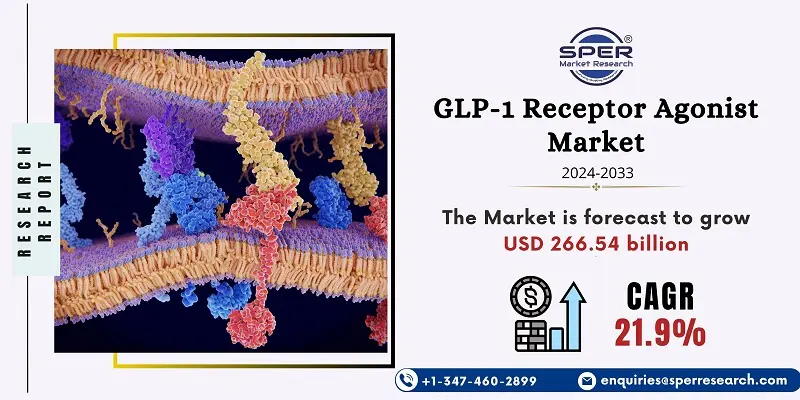
GLP-1 Receptor Agonist Market Trends, Share, Demand, Size, Competition and Future Outlook
GLP-1 Receptor Agonist Market Growth, Size, Trends Analysis- By Product, By Application, By Route of Administration, By Distribution Channel- Regional Outlook, Competitive Strategies and Segment Forecast to 2033
| Published: Oct-2024 | Report ID: PHAR2415 | Pages: 1 - 243 | Formats*: |
| Category : Pharmaceutical | |||
- In February 2024, Eli Lilly and Company announced that if Mounjaro, their extremely effective diabetes drug and obesity treatment, survives a continuing regulatory review, it might be introduced in India as early as the following year. This product should have a favorable effect on the growth of the Indian market.
- Even though it is having trouble meeting demand in its current territories, Novo Nordisk A/S announced in November 2023 that it would offer its very successful anti-obesity medication, Wegovy, in Japan on February 22. This would be the company's first Asian launch.


| Report Metric | Details |
| Market size available for years | 2020-2033 |
| Base year considered | 2023 |
| Forecast period | 2024-2033 |
| Segments covered | By Product, By Application, By Route of Administration, By Distribution Channel |
| Regions covered | North America, Asia-Pacific, Latin America, Middle East & Africa and Europe |
| Companies Covered | Eli Lilly and Company; Novo Nordisk A/S; AstraZeneca, Sanofi. |
- Healthcare Providers
- Patients with Type 2 Diabetes
- Obesity Patients
- Endocrinologists
- Diabetes Educators
- Pharmacists
- Insurance Companies
- Pharmaceutical Companies
| By Product: | |
| By Application: | |
| By Route of Administration: | |
| By Distribution Channel: |
- Global GLP-1 Receptor Agonist Market Size (FY’2024-FY’2033)
- Overview of Global GLP-1 Receptor Agonist Market
- Segmentation of Global GLP-1 Receptor Agonist Market By Product (Ozempic,k Trulicity, Mounjaro, Wegovy, Rybelsus, Saxenda, Victoza, Zepbound, Other)
- Segmentation of Global GLP-1 Receptor Agonist Market By Application (Type 2 Diabetes Mellitus, Obesity)
- Segmentation of Global GLP-1 Receptor Agonist Market By Route of Administration (Parenteral, Oral)
- Segmentation of Global GLP-1 Receptor Agonist Market By Distribution Channel (Hospital Pharmacies, Retail Pharmacies, Online Pharmacies)
- Statistical Snap of Global GLP-1 Receptor Agonist Market
- Expansion Analysis of Global GLP-1 Receptor Agonist Market
- Problems and Obstacles in Global GLP-1 Receptor Agonist Market
- Competitive Landscape in the Global GLP-1 Receptor Agonist Market
- Impact of COVID-19 and Demonetization on Global GLP-1 Receptor Agonist Market
- Details on Current Investment in Global GLP-1 Receptor Agonist Market
- Competitive Analysis of Global GLP-1 Receptor Agonist Market
- Prominent Players in the Global GLP-1 Receptor Agonist Market
- SWOT Analysis of Global GLP-1 Receptor Agonist Market
- Global GLP-1 Receptor Agonist Market Future Outlook and Projections (FY’2024-FY’2033)
- Recommendations from Analyst
1.1. Scope of the report1.2. Market segment analysis
2.1. Research data source2.1.1. Secondary Data2.1.2. Primary Data2.1.3. SPER’s internal database2.1.4. Premium insight from KOL’s2.2. Market size estimation2.2.1. Top-down and Bottom-up approach2.3. Data triangulation
4.1. Driver, Restraint, Opportunity and Challenges analysis4.1.1. Drivers4.1.2. Restraints4.1.3. Opportunities4.1.4. Challenges4.2. COVID-19 Impacts of the Global GLP-1 Receptor Agonist Market.
5.1. SWOT Analysis5.1.1. Strengths5.1.2. Weaknesses5.1.3. Opportunities5.1.4. Threats5.2. PESTEL Analysis5.2.1. Political Landscape5.2.2. Economic Landscape5.2.3. Social Landscape5.2.4. Technological Landscape5.2.5. Environmental Landscape5.2.6. Legal Landscape5.3. PORTER’s Five Forces5.3.1. Bargaining power of suppliers5.3.2. Bargaining power of buyers5.3.3. Threat of Substitute5.3.4. Threat of new entrant5.3.5. Competitive rivalry5.4. Heat Map Analysis
6.1. Global GLP-1 Receptor Agonist Market Manufacturing Base Distribution, Sales Area, Product Type6.2. Mergers & Acquisitions, Partnerships, Product Launch, and Collaboration in Global GLP-1 Receptor Agonist Market
7.1. Global GLP-1 Receptor Agonist Market Size, Share and Forecast, By Product, 2020-20267.2. Global GLP-1 Receptor Agonist Market Size, Share and Forecast, By Product, 2027-20337.3. Ozempic7.4. Trulicity7.5. Mounjaro7.6. Wegovy7.7. Rybelsus7.8. Saxenda7.9. Victoza7.10. Zepbound7.11. Other Products
8.1. Global GLP-1 Receptor Agonist Market Size, Share and Forecast, By Application, 2020-20268.2. Global GLP-1 Receptor Agonist Market Size, Share and Forecast, By Application, 2027-20338.3. Type 2 Diabetes Mellitus8.4. Obesity
9.1. Global GLP-1 Receptor Agonist Market Size, Share and Forecast, By Route of Administration, 2020-20269.2. Global GLP-1 Receptor Agonist Market Size, Share and Forecast, By Route of Administration, 2027-20339.3. Parenteral9.4. Oral
10.1. Global GLP-1 Receptor Agonist Market Size, Share and Forecast, By Distribution Channel, 2020-202610.2. Global GLP-1 Receptor Agonist Market Size, Share and Forecast, By Distribution Channel, 2027-203310.3. Hospital Pharmacies10.4. Retail Pharmacies10.5. Online Pharmacies
11.1. Global GLP-1 Receptor Agonist Market Size and Market Share
12.1. Global GLP-1 Receptor Agonist Market Size and Market Share By Region (2020-2026)12.2. Global GLP-1 Receptor Agonist Market Size and Market Share By Region (2027-2033)12.3. Asia-Pacific12.3.1. Australia12.3.2. China12.3.3. India12.3.4. Japan12.3.5. South Korea12.3.6. Rest of Asia-Pacific12.4. Europe12.4.1. France12.4.2. Germany12.4.3. Italy12.4.4. Spain12.4.5. United Kingdom12.4.6. Rest of Europe12.5. Middle East and Africa12.5.1. Kingdom of Saudi Arabia12.5.2. United Arab Emirates12.5.3. Qatar12.5.4. South Africa12.5.5. Egypt12.5.6. Morocco12.5.7. Nigeria12.5.8. Rest of Middle-East and Africa12.6. North America12.6.1. Canada12.6.2. Mexico12.6.3. United States12.7. Latin America12.7.1. Argentina12.7.2. Brazil12.7.3. Rest of Latin America
13.1. Eli Lilly and Company13.1.1. Company details13.1.2. Financial outlook13.1.3. Product summary13.1.4. Recent developments13.2. Sanofi13.2.1. Company details13.2.2. Financial outlook13.2.3. Product summary13.2.4. Recent developments13.3. Novo Nordisk A/S13.3.1. Company details13.3.2. Financial outlook13.3.3. Product summary13.3.4. Recent developments13.4. AstraZeneca13.4.1. Company details13.4.2. Financial outlook13.4.3. Product summary13.4.4. Recent developments13.5. Others
SPER Market Research’s methodology uses great emphasis on primary research to ensure that the market intelligence insights are up to date, reliable and accurate. Primary interviews are done with players involved in each phase of a supply chain to analyze the market forecasting. The secondary research method is used to help you fully understand how the future markets and the spending patterns look likes.
The report is based on in-depth qualitative and quantitative analysis of the Product Market. The quantitative analysis involves the application of various projection and sampling techniques. The qualitative analysis involves primary interviews, surveys, and vendor briefings. The data gathered as a result of these processes are validated through experts opinion. Our research methodology entails an ideal mixture of primary and secondary initiatives.



Frequently Asked Questions About This Report
PLACE AN ORDER
Year End Discount
Sample Report
Pre-Purchase Inquiry
NEED CUSTOMIZATION?
Request CustomizationCALL OR EMAIL US
100% Secure Payment






Related Reports
Our Global Clients
Our data-driven insights have influenced the strategy of 200+ reputed companies across the globe.




















